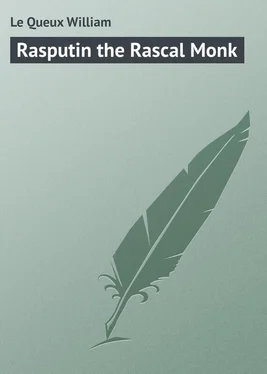William Le Queux - Rasputin the Rascal Monk
Здесь есть возможность читать онлайн «William Le Queux - Rasputin the Rascal Monk» — ознакомительный отрывок электронной книги совершенно бесплатно, а после прочтения отрывка купить полную версию. В некоторых случаях можно слушать аудио, скачать через торрент в формате fb2 и присутствует краткое содержание. Жанр: foreign_language, foreign_prose, на английском языке. Описание произведения, (предисловие) а так же отзывы посетителей доступны на портале библиотеки ЛибКат.
- Название:Rasputin the Rascal Monk
- Автор:
- Жанр:
- Год:неизвестен
- ISBN:нет данных
- Рейтинг книги:3 / 5. Голосов: 1
-
Избранное:Добавить в избранное
- Отзывы:
-
Ваша оценка:
- 60
- 1
- 2
- 3
- 4
- 5
Rasputin the Rascal Monk: краткое содержание, описание и аннотация
Предлагаем к чтению аннотацию, описание, краткое содержание или предисловие (зависит от того, что написал сам автор книги «Rasputin the Rascal Monk»). Если вы не нашли необходимую информацию о книге — напишите в комментариях, мы постараемся отыскать её.
Rasputin the Rascal Monk — читать онлайн ознакомительный отрывок
Ниже представлен текст книги, разбитый по страницам. Система сохранения места последней прочитанной страницы, позволяет с удобством читать онлайн бесплатно книгу «Rasputin the Rascal Monk», без необходимости каждый раз заново искать на чём Вы остановились. Поставьте закладку, и сможете в любой момент перейти на страницу, на которой закончили чтение.
Интервал:
Закладка:
This, however, was but one illustration of the power which the rascally ex-highwayman had secured over the Imperial Court, and hence over the great Russian Empire itself. His influence was more powerful than that of all the Grand Dukes, the Council of the Empire, and the Council of Ministers put together. True, His Majesty was Tsar, but Gregory Rasputin was equally powerful, if not more so, because of his innate craftiness, his pseudo-divinity, his mock miracles, and the support he received from a certain section of the Church.
Possessed of the curious cunning of the erotic criminal lunatic, Rasputin never allowed matters to run calmly for very long. He was much too clever for that, well knowing, that while Protopopoff, Minister of the Interior was his friend, he had as powerful enemies, both Stolypin and Miliukoff – who, later on, became Minister for Foreign Affairs. Both the latter he feared, as well as the Grand Duke Nicholas Michailovitch.
The latter had secretly learnt much concerning the ex-thief of the far-off Siberian village – more, indeed, than Rasputin had ever dreamed. One day, a week after the departure of Mademoiselle Sophie Tutcheff, the Grand Duke attended a great reception at the Winter Palace. The usual brilliant throng had assembled; the usual Imperial procession had taken place down the great Nicholas Hall, that famous salon wherein three thousand people can dance at one time – the salon the walls of which are adorned with golden plates, and where on the night of a Court ball the assembly is indeed a gorgeous one of stars, medals, exquisite dresses and brilliant uniforms. Though Russia was at war, the Empress had given the ball, and all Russian Court Society had assembled.
Among the throng were two men the Bishop Teofan, of the Pravoslavny Church, and with him the monk, silent and unbending, upon whom the eyes of all the women were turned. Naturally there were many strange whisperings among those who were “Believers” and those who had not been initiated into the cult of the “Sister-disciples,” whispers among the old and young – whispers which were not meant for any male ear.
Bishop and monk passed down the great ballroom, through the beautiful winter-garden beyond, where many men and women were chatting beneath the palms, and then into the Oriental gallery, a place decorated with those engraved golden and silver plates which Catherine the Great received with bread and salt from those who came to do her homage.
Thence the pair disappeared into one of the side rooms to what is known as the Jordan Entrance.
A tall, bald-headed man with heavy brow, moustache, small round beard, and wearing a brilliant white uniform with many decorations had followed the pair from the ball-room. With him walked a young, clean-shaven, dark-haired man in uniform, erect and determined.
The elder was the Grand Duke Nicholas Michailovitch, the younger the Grand Duke Dmitri Pavlovitch.
They entered the small room unceremoniously, and confronted the illiterate Bishop and the peasant charlatan.
“We have come to turn you out of the Palace!” exclaimed the elder man firmly. “Your presence is obnoxious to us, especially the charlatan of Pokrovsky. We are Grand Dukes of Russia, and we have no intention to mix with convicted thieves and beguilers of women! Come!” His Imperial Highness cried, “Go! You are not wanted here!”
“And pray by what right do you speak thus?” asked the Starets with offensive insolence.
“By the right of my position,” was the Grand Duke’s reply.
In response, Rasputin spat upon the pale blue carpet in defiance.
In a moment the young Grand Duke Dmitri Pavlovitch, an athletic young officer who had only the day before returned from the German Front where he had been with von Rennenkampf, took the dirty monk by the scruff of his neck and flung him outside into the big marble hall, administering to him a severe kick in the presence of a dozen of the astonished Palace guards.
“Put this scoundrel outside!” he commanded the men, and two minutes later, Rasputin, with his dirty black habit badly torn, found himself flung down the steps headlong into the snow.
Meanwhile the Grand Duke Nicholas had administered to the dissolute Bishop – whose sister, by the way, was one of Rasputin’s “spiritual brides” at his monastery, or harem, at Pokrovsky – a very severe castigation and with his own hands had torn the big crucifix from his neck and cast it across the room.
Then, when at last the Bishop emerged into the Hall, he shared, at the Grand Duke’s order, the same indignity that had befallen the dissolute blackguard whom the Empress caressed and called her “Holy Father.”
Of this episode Rasputin made no mention to Her Majesty. It, however, caused him considerable misgivings and before morning he had decided upon a dramatic course of action.
Next afternoon, a Wednesday, was the day fixed for the usual performance of the bi-weekly secret rites. He took luncheon with the Emperor and Empress in their private apartments, Madame Vyrubova alone being the only other person at table.
Suddenly the monk who had been talking with the Emperor, using his uncouth Siberian expressions, and even eating with his fingers, clasped his knotted, peasant fingers together and turning to the Empress, announced:
“To-night, Great Lady, I go upon a pilgrimage. Divine God has called me to Moscow, where work there awaits me. I know not what it is, but when I arrive there I shall receive His divine direction. Alexis will be well in my absence, and will improve, for twice each day he will have my prayers. God has called me – I cannot remain.”
“Not even this afternoon?” gasped the unnerved hysterical woman who was Empress of Russia in this our Twentieth Century.
“No. I must take leave of you, great lady, to obey the call,” was his deep answer.
And by that night’s express he left in a luxurious sleeping-berth for Moscow where, truth to tell, the Countess Ignatieff was awaiting him.
The only “call” the licentious blackguard had received was the news that two very prepossessing young girls, named Vera and Xénie, daughters of the late Baroness Koulomzine, of Moscow, had expressed their desire to Countess Ignatieff to join the secret cult. The Countess had shown him their photographs and the libertine, in pretence of performing a pilgrimage, travelled to Moscow in order to initiate them. Next day, at the Convent of the Ascension, where the libertine had spent the night, he interviewed the two young gentlewomen. Before an ikon with flowers upon the altar and in the presence of the Lady-Superior, he exorcised their sins according to his prescribed rite.
It was a strange scene. The penitents in the dimly-lit chapel each touched their forehead and breast with thumb and forefinger, gazing immobile and fascinated at the miracle-working “Master,” their lips moving in proper response to the prayers of the Heaven-sent confessor.
At what subsequently transpired I can only hint. According to the official report before me the girls confessed to two officers, their half-brothers, that after the benediction the verminous monk induced them both to go to the Turkish baths together, for “purification” as he put it.
Well, the mock-monk found himself under arrest, and only by the most strenuous efforts of the Countess Ignatieff was he released, after spending forty hours in a cell.
But Rasputin merely smiled. He knew his own power. Next day he returned to Petrograd, and within twelve hours of his arrival Plestcheff, Chief of Police of Moscow, had, at the instance of the Empress, been relieved of his post in disgrace.
Rasputin’s exploits in Moscow brought him very nearly to disaster.
Master-criminal that he was and as my intention is to show, he calmly reviewed his position, and saw that by cleverly playing his cards – now that the Empress and her easily gulled Court had become so completely enthralled by his “wonder-working” – he might assume his own position as the most powerful man in the Empire.
Читать дальшеИнтервал:
Закладка:
Похожие книги на «Rasputin the Rascal Monk»
Представляем Вашему вниманию похожие книги на «Rasputin the Rascal Monk» списком для выбора. Мы отобрали схожую по названию и смыслу литературу в надежде предоставить читателям больше вариантов отыскать новые, интересные, ещё непрочитанные произведения.
Обсуждение, отзывы о книге «Rasputin the Rascal Monk» и просто собственные мнения читателей. Оставьте ваши комментарии, напишите, что Вы думаете о произведении, его смысле или главных героях. Укажите что конкретно понравилось, а что нет, и почему Вы так считаете.












